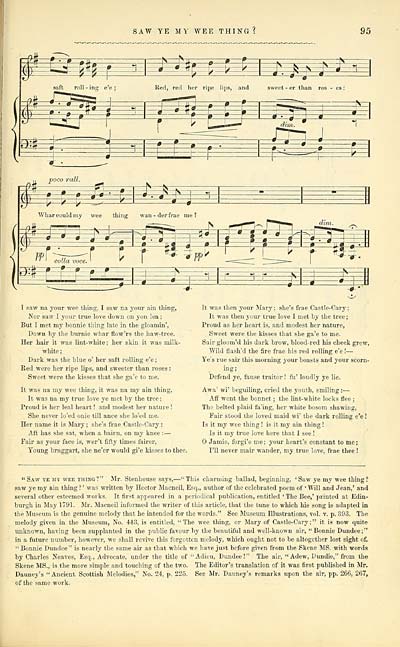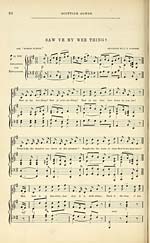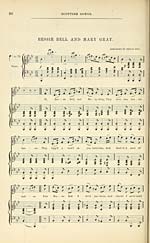Glen Collection of printed music > Printed music > Songs of Scotland > Volume 2
(103) Page 95
Download files
Complete book:
Individual page:
Thumbnail gallery: Grid view | List view

SAW YE MY WEE THING?
95
i^^^si^
^eS
-» — t
m
"XiL-i.
=^
■^^
^^^-
J2=52:
saft roll - ing e'e ;
*E^^^
Red, red lier ripe lips, and sweet - er than ros - es :
poco rail.
^
iE5
f^=9.-rjL-*-^-t
^^
^^.
-/ — =^ -
Whar could my wee thing wan-derfrae me?
§=^^^
=^
^
-^-F-
I saw na your wee thing, I saw na your ain thing,
Nor saw I yoiir true lo¥e down on yon lea ;
But I met my bonnie thing late in the gloamin',
Down by the bm-nie whar fiow'rs the haw-tree.
Her hair it was lint-white ; her skin it was milk-
wMte ;
Dark was the blue o' her saft rolling e'e ;
Red were her ripe lips, and sweeter than roses :
Sweet were the kisses that she ga'e to me.
It was na my wee thing, it was na my ain thing.
It was na my true love ye met by the tree ;
Proud is her leal heart ! and modest her nature !
She never lo'ed onie till ance she lo'ed me.
Her name it is Mary ; she's frae Castle-Cary :
Aft has she sat, when a bairn, on my knee : —
Fair as your face is, wer't fifty times fairer,
Young braggart, she ne'er would gi'e kisses to thee.
It was then your Mary ; she's frae Castle-Cary ;
It was then your true love I met by the tree ;
Proud as her heart is, and modest her nature,
Sweet were the kisses that she ga'e to me.
Sair gloom'd his dark brow, blood-red his cheek grew,
Wild flash'd the Sre frae his red rolling e'e ! —
Ye's rue sair this morning your boasts and your scorn-
ing;
Defend ye, fause traitor ! fu' loudly ye lie.
Awa' wi' beguiling, cried the youth, smiling : —
Aif went the bonnet ; the lint-white locks flee ;
The belted plaid fa'ing, her white bosom shawing.
Fair stood the loved maid wi' the dark rolling e'e !
Is it my wee thing ! is it my ain thing !
Is it my true love here that I see !
Jamie, forgi'e me; your heart's constant to me;
I'll never mair wander, my true love, frae thee !
" Saw te bit wee thing ? " Mr. Stenhouse says, — " This charming ballad, beginning, ' Saw ye my wee thing ?
saw ye my ain thing ? ' was written by Hector Macneil, Esq., author of the celebrated poem of ' Will and Jean,' and
several other esteemed works. It first appeared in a periodical publication, entitled ' The Bee,' printed at Edin-
burgh in May 1791. Mr. Macneil informed the writer of this article, that the tune to which his song is adapted in
the Museum is the genuine melody that he intended for the words." See Museum Blustrations, vol. v. p. 893. The
melody given in the Museum, No. 44.3, is entitled, "The wee tiling, or Mary of Castle-Cary;" it is now quite
unknown, having been supplanted in the public favour by the beautiful and well-known air, " Bonnie Dundee ; "
in a future number, however, we shall revive this forgotten melody, which ought not to be altogether lost sight of.
"Bonnie Dundee" is nearly the same air as that which we have just before given from the Skene MS. with words
by Charles Neaves, Esq., Advocate, under the title of " Adieu, Dimdee ! " The air, " Adew, Dundie," from the
Skene MS., is the more simple and touching of the two. The Editor's translation of it was first published in Mr.
Dauney's " Ancient Scottish Melodies," No. 24, p. 225. See Mr. Dauney's remarks upon the air, pp. 266, 267,
of the same work.
95
i^^^si^
^eS
-» — t
m
"XiL-i.
=^
■^^
^^^-
J2=52:
saft roll - ing e'e ;
*E^^^
Red, red lier ripe lips, and sweet - er than ros - es :
poco rail.
^
iE5
f^=9.-rjL-*-^-t
^^
^^.
-/ — =^ -
Whar could my wee thing wan-derfrae me?
§=^^^
=^
^
-^-F-
I saw na your wee thing, I saw na your ain thing,
Nor saw I yoiir true lo¥e down on yon lea ;
But I met my bonnie thing late in the gloamin',
Down by the bm-nie whar fiow'rs the haw-tree.
Her hair it was lint-white ; her skin it was milk-
wMte ;
Dark was the blue o' her saft rolling e'e ;
Red were her ripe lips, and sweeter than roses :
Sweet were the kisses that she ga'e to me.
It was na my wee thing, it was na my ain thing.
It was na my true love ye met by the tree ;
Proud is her leal heart ! and modest her nature !
She never lo'ed onie till ance she lo'ed me.
Her name it is Mary ; she's frae Castle-Cary :
Aft has she sat, when a bairn, on my knee : —
Fair as your face is, wer't fifty times fairer,
Young braggart, she ne'er would gi'e kisses to thee.
It was then your Mary ; she's frae Castle-Cary ;
It was then your true love I met by the tree ;
Proud as her heart is, and modest her nature,
Sweet were the kisses that she ga'e to me.
Sair gloom'd his dark brow, blood-red his cheek grew,
Wild flash'd the Sre frae his red rolling e'e ! —
Ye's rue sair this morning your boasts and your scorn-
ing;
Defend ye, fause traitor ! fu' loudly ye lie.
Awa' wi' beguiling, cried the youth, smiling : —
Aif went the bonnet ; the lint-white locks flee ;
The belted plaid fa'ing, her white bosom shawing.
Fair stood the loved maid wi' the dark rolling e'e !
Is it my wee thing ! is it my ain thing !
Is it my true love here that I see !
Jamie, forgi'e me; your heart's constant to me;
I'll never mair wander, my true love, frae thee !
" Saw te bit wee thing ? " Mr. Stenhouse says, — " This charming ballad, beginning, ' Saw ye my wee thing ?
saw ye my ain thing ? ' was written by Hector Macneil, Esq., author of the celebrated poem of ' Will and Jean,' and
several other esteemed works. It first appeared in a periodical publication, entitled ' The Bee,' printed at Edin-
burgh in May 1791. Mr. Macneil informed the writer of this article, that the tune to which his song is adapted in
the Museum is the genuine melody that he intended for the words." See Museum Blustrations, vol. v. p. 893. The
melody given in the Museum, No. 44.3, is entitled, "The wee tiling, or Mary of Castle-Cary;" it is now quite
unknown, having been supplanted in the public favour by the beautiful and well-known air, " Bonnie Dundee ; "
in a future number, however, we shall revive this forgotten melody, which ought not to be altogether lost sight of.
"Bonnie Dundee" is nearly the same air as that which we have just before given from the Skene MS. with words
by Charles Neaves, Esq., Advocate, under the title of " Adieu, Dimdee ! " The air, " Adew, Dundie," from the
Skene MS., is the more simple and touching of the two. The Editor's translation of it was first published in Mr.
Dauney's " Ancient Scottish Melodies," No. 24, p. 225. See Mr. Dauney's remarks upon the air, pp. 266, 267,
of the same work.
Set display mode to: Large image | Transcription
Images and transcriptions on this page, including medium image downloads, may be used under the Creative Commons Attribution 4.0 International Licence unless otherwise stated. ![]()
| Special collections of printed music > Glen Collection of printed music > Printed music > Songs of Scotland > Volume 2 > (103) Page 95 |
|---|
| Permanent URL | https://digital.nls.uk/91336401 |
|---|
| Shelfmark | Glen.214a |
|---|---|
| Additional NLS resources: | |
| Attribution and copyright: |
|
| Description | Scottish songs and music of the 18th and early 19th centuries, including music for the Highland bagpipe. These are selected items from the collection of John Glen (1833 to 1904). Also includes a few manuscripts, some treatises, and other books on the subject. |
|---|
| Description | The Glen Collection and the Inglis Collection represent mainly 18th and 19th century Scottish music, including Scottish songs. The collections of Berlioz and Verdi collected by bibliographer Cecil Hopkinson contain contemporary and later editions of the works of the two composers Berlioz and Verdi. |
|---|

